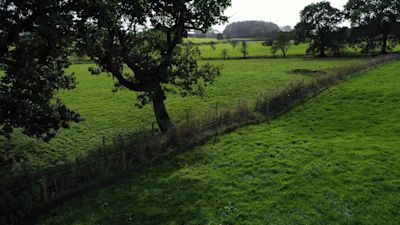Climate change: could the hedgerow be the answer to answer to global warming?

A farm is hoping it has found a key to help mitigate the climate crisis - the hedgerow.
When it comes to climate debates, we're often told we should eat less meat and dairy as farming equates to about 10% of all the UK's greenhouse gases.
But, at Carter Fold Farm near Clitheroe, they're hoping by reintroducing a network of hedgerows they can address the huge amounts of carbon dioxide and nitrous oxide produced by agriculture.
They've already planted 1,000 metres with another 750 to go.
Why hedges?
The humble hedgerow is in fact one of nature's superheroes - not only are they crucial in helping to capture and store dangerous greenhouse gases, they also help protect against flooding, suck pollutants out of water and they create habitats for a huge number of different species.
Farmer Sarah Bolton says: "It is working for both the farming sides of things that we get better rotational grazing for the stock but then we're also giving something back.
"So the hedgerow links up corridors, thats really good for wildlife, pollinators, birds, so it's ticking all the boxes really."
But since the Second World War, around half of the UK's hedgerows have been ripped from the landscape.
The seams of the country's "patchwork quilt" unthreading and with it their ability to suck up carbon dioxide.
That is why the UK's committee on climate change has suggested the UK's hedgerow network be extended by 40% as part of the 2050 net zero targets
And planting more hedgerows is something we can all get involved in.
On Sarah's farm, they got the village to help out.
But while farming does hold solutions, it is still seen by many as a climate villain.
The National Farmers Union has an aspiration to make the industry carbon neutral by 2040, by making production more energy efficient, improving carbon capture on farms and making them more energy efficient.
Adam Briggs, Environment advisor for NFU in North West, says it's not that we should eat less meat and dairy, but that the industry should do more to reduce emissions and soak up carbon to make farms more environmentally friendly.
"The debate around eating less meat and dairy is unhelpful. There are lots of opportunities for using land, that is not just for producing food, but sequestering carbon.
"In many areas of the North West there are no other options for managing land for food than growing grass and feeding sheep and cattle.
"It's not just a matter of we'll take that land which is being used to produce meat and dairy and use that to produce plant-based food. It just isn't practical."
The NFU say that farms vary enormously, so there’s no one size fits all solution - each farm needs to tailor its own approach.
If UK farmers produce less meat and dairy there is a danger that we’d just end up importing more, and effectively simply export the problem, and it could also impact on our food security in uncertain times.
Adam Briggs, NFU, continues: "Climate is changing and we all have a part to play in that and I think farmers do need to play their part.
"It makes economy sense, a lot of the actions that help tackle climate change also help add profitability to the bottom line.
"Also there are going to be economic opportunities around the climate agenda. Carbon will be a commodity so theres an opportunity for farmers to get paid for the carbon they sequester as well."
And as world leaders prepare to meet for COP 26, farming will be a key issue on the table.